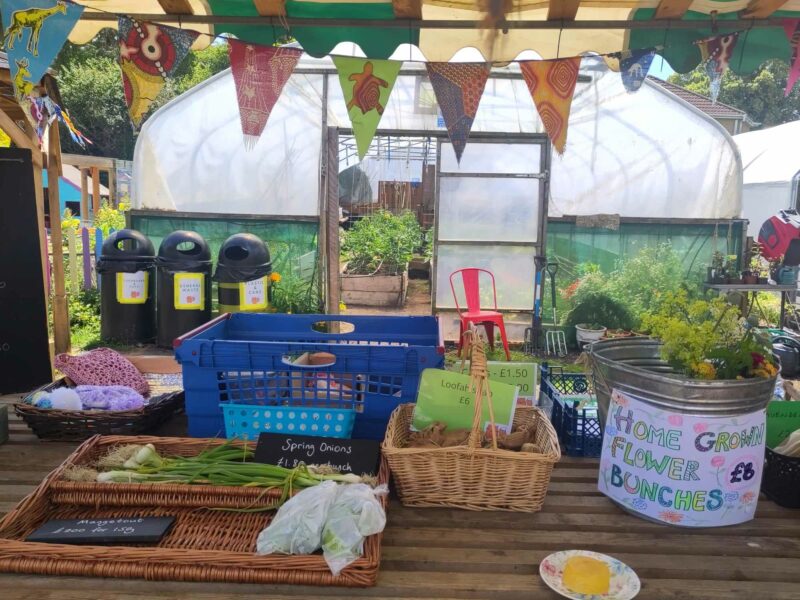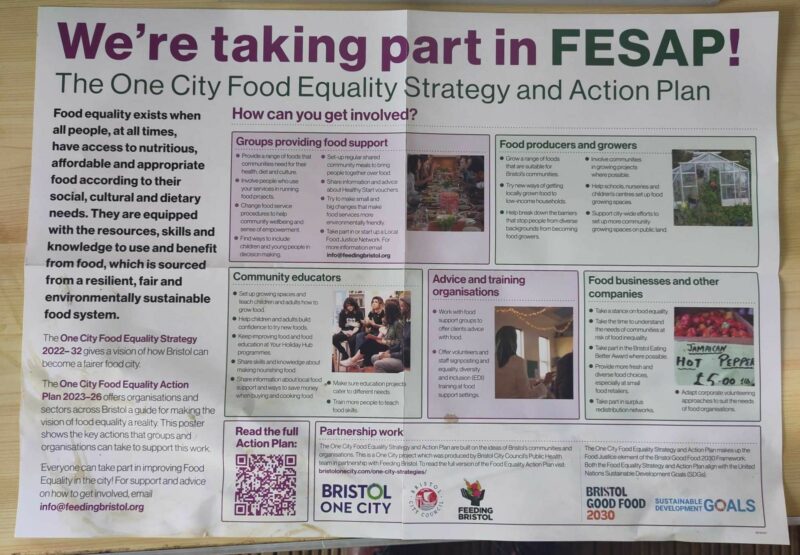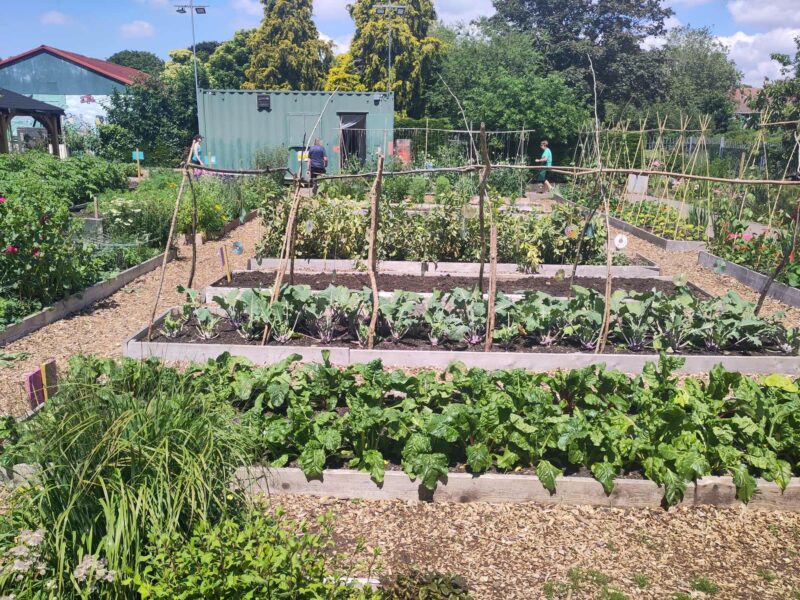Residents are helping to make Knowle West a healthier place, backed by a £20,000 funding pot.
Shaping Places, an NHS and local government programme, is designed to improve community health through changes to local social, environmental and economic systems, from food security to mental health and fear of antisocial behaviour.
In Knowle West community-led solutions are focusing on food and nature. Kerry McCarthy, whose Bristol East constituency now encompasses parts of Knowle, said,
“Food policy is the answer to so many of our problems.”

The Redcatch garden sells fresh produce, flowers, herbs and other locally-made products as well as hosting nature, gardening and other creative activities
Mike Cardwell has been leading on developing Shaping Places in the area.
A frustrated social worker, seven years ago he co-founded the Redcatch Community Garden which transformed a Knowle bowling green into a thriving nature-filled space for food growing, tai chi, art therapy and many more social activities that boost wellbeing.
The free weekly ‘Welcoming Spaces’ community lunch is provided to all who turn up, no questions asked.
Mike sees food as the key to improving local quality of life.
“People are interested in what we grow and have more understanding about what food miles are and what’s nutritious,” he said.
“It’s a drip feed – you can’t say ‘immediately cut out all ultra-processed food.’ People come and look around, buy herbs and grow them in their garden, use them in cooking. They learn from each other.
“Welcoming Spaces is brilliant – it means people get at least one decent meal a week cooked from scratch.”
Mike formed a group of residents to co-design Shaping Places.
“They’re the locals, they’ve got all the experience and live within the community, so we asked them what they thought would work,” he said.

The garden hosted an event for Food Justice Fortnight and are part of a citywide strategy working to improve equal access to healthy, affordable and culturally-appropriate food
Three ideas emerged.
Micro-grants – delivered with the support of the Knowle West Alliance – will pay for raised beds for educational growing at Illminster and Connaught schools, and at Belfast Walk community garden where heritage beans will be grown for ‘baked bean’ cooking workshops.
Mike is thrilled:
“One billion cans of Heinz are produced from imported beans every year, but these are British beans we can grow and cook with instead.”
They will also establish hanging baskets – including edible versions – on Newquay Road to, according to Mike, “send a strong signal that we care about and can make this area look beautiful.”
In the second Shaping Places initiative, a slow cooker has been loaned to families identified by GP’s and schools. Square Food Foundation delivered ingredients to participants, who were then able to cook nutritious family meals despite budget and time pressures.
The remaining £13,000 of the funding pot will be used on a ‘community cook-off’ project, with batches of meals cooked up and offered out to the community for ‘whatever they can afford.’
For this project, the Redcatch Garden Cooks have partnered with the Connaught Oasis Food Hub which has provided space for cooking and storing meals in a large community chest freezer.
The eventual aim is to offer £2 meals to residents that attend the Welcoming Spaces lunch.
“The price point will be the same as an Iceland meal, but much more nutritious and climate-friendly,” said Mike. “We’ll use as much produce from the garden as possible, all cooked from scratch, nothing ultra-processed.”
He admits the hardest part is producing enough fresh veg to fulfil demand, but the issue can be tackled by using local suppliers such as Lush Greens or local allotment schemes where surplus is passed on to service providers.
“Really it needs the council driving that with allotment holders,” said Mike. “For now we’re being realistic. We try to buy local where we can.”

Beds of fresh veg are grown at Redcatch but, Mike said, it’s hard to grow enough to meet demand from the local community
Kerry McCarthy visited the Redcatch garden, which now falls in her constituency following this year’s boundary changes, as part of Food Justice Fortnight.
“Projects like this approach food from a really positive angle, not just telling people ‘don’t do this’, but demonstrating that food can be healthy, you can have a role in growing it, and there’s a social aspect too,” she said.
“Redcatch is a model that can be replicated.”
“Public health is the most compelling side” of food policy’s impact, said McCarthy.
“People are now more likely to die of lifestyle-related illnesses than communicable diseases.
“Bristol has such a food culture but equally there are food deserts with terrible public health outcomes.”
Communities could benefit from more growing projects, she said.
“There are a lot of amazing projects – Grow Wilder, community and dementia-friendly allotments. But whereas the council can make land available, you tend to need wonderful people in the community with ambition.
“Stockwood has been part of my constituency for 19 years. There’s so much green space, some of which could be used for food growing or community orchards. It’s not a problem of where, but who.
“My role is to support the people that want to make these things happen. Sometimes it’s just about putting people in touch with each other – Bristol is brilliant for that.”





